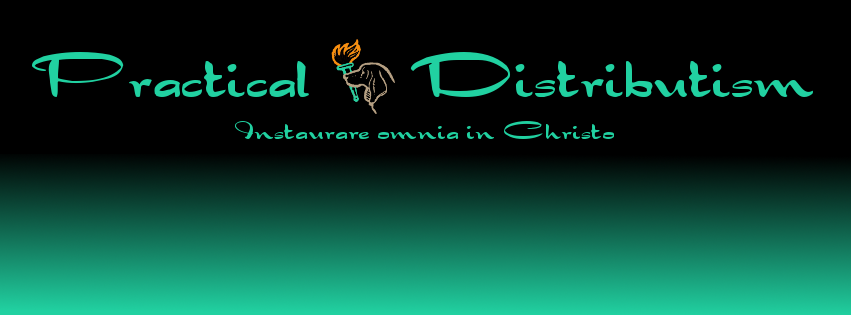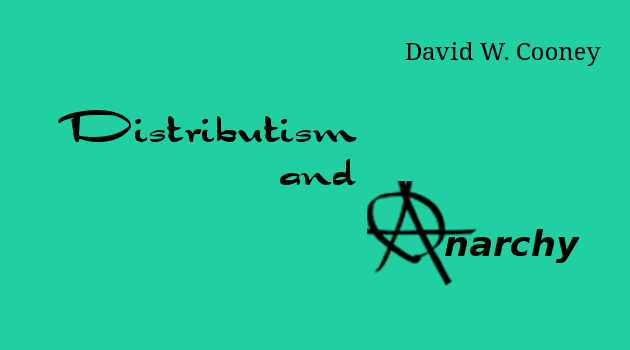Given distributism's insistence that government cannot interfere in the internal life of the family, and that higher levels of government cannot interfere in things that are properly the role of lower levels of government, and that things like charity are properly the role of family, church, and local organizations, can we say that distributists are also anarchists?
Consider the following. Dorothy Day accepted and used the term anarchist in regard to herself and her views. However, while she did denounce all war (she was a pacifist), and the tendency of government welfare programs to create dependency among the poor, she spoke positively of other efforts made by government to assist those in need. This article does not propose to answer this question about Dorothy Day. I have not read her writings thoroughly, so I have to ask if she ever denounced the mere existence of government. Anarchists themselves seemed confused at her positions given that she converted to Catholicism, a religion with its own clearly defined government.
My point is that some people seem to think that merely stating that government has limits beyond those mentioned in a constitution or other founding document is anarchy. Is it anarchy to say that the central government doesn't have the authority to regulate local matters? Is it anarchy to say that local government doesn't have the authority to say you cannot give money to someone on the street, or grow food in your yard, or home school your children, or that your child cannot run a little lemonade stand without a business license, food handlers permit and health inspections?
None of these things really constitute anarchy, but they may more clearly reveal the difference between what most people call "limited government" and subsidiarity. The concept of limited government is that a positive law (one established by people) sets the limits of government. Therefore, the people determine the authority of government and may grant or remove power as they see fit. Subsidiarity, on the other hand, would answer that there are natural limits to the power of government. Even if a law were written granting power beyond those limits, it would be unjust and void based on that injustice and its violation of the common good.
Let's take the example of someone growing food in their yard in defiance of a law. If he did so because he believes that there should be no government, then he can be called an anarchist according to its real meaning. If, however, he did so on the basis that such a law goes beyond a government's authority according to the principle of subsidiarity, then he cannot truly be called an anarchist even if he welcomes the term or uses it himself. This is because he is not denying that there should be a government, he is merely exercising his belief that he is free to disregard an unjust law. This is not truly anarchy.
The philosophical definition of subsidiarity is that "what can be done by the lower ought not be done by the higher." Catholic Social Teaching has expanded on that without changing its basic meaning.
"A community of a higher order should not interfere in the internal life of
a community of a lower order, depriving the latter of its functions,
but rather should support it in case of need and help to coordinate its
activity with the activities of the rest of society, always with a view
of the common good."
Note here that both of these definitions assume the existence of higher orders of society. Subsidiarity is not just Catholic teaching, but a fundamental principle of reason. It therefore applies not just to government, but to other aspects of life where it can be used. Our obligation to have charity for those in need, parents' obligation to raise and educate their children, our obligation to provide for our own needs and the needs of our families, subsidiarity can apply to all of these. Therefore, higher orders of society can assist the lower in times where it is necessary, but cannot usurp the natural functions of those lower orders, or their authority regarding how they fulfill those functions.
For the distributist, the citizen is not a childlike person in need of an overbearing government to tell him what he can and cannot do in any and every aspect of his life. Government only has the authority to regulate when it is necessary for the common good, and even then it is obligated to ensure that its regulations only go as far as necessary and do not interfere with the ability of the lower orders of society to fulfill their functions and obligations. We do not oppose the Affordable Care Act because we don't believe that something should be done to assist those who need health care. We oppose it because it is a flagrant violation of subsidiarity. We don't oppose federal and state welfare programs because we don't believe that those in need should be helped. We do so because they violate the principle of subsidiarity and create a state of dependence on government that corrupts the proper relationship between government and citizen.
On the other hand, we don't oppose state and federal aid in the cases of natural disasters except to the extent that it is conditioned on those higher orders being able to take control. We don't oppose the idea of organized health coverage or programs to assist the poor and others in need if they are controlled at the local level and funding is as local as practical. We believe that charity starts at home and within the community, that it should be managed at these levels, and that the government simply does not have the right to interfere with it. Some people may choose to act according to these beliefs even if there are laws against it. That is not anarchy.


No comments:
Post a Comment
Because we have moved to our new site at https://practicaldistributism.com, commenting on this site has been turned off.
Please visit our new site to see new articles and to comment. Thank you!
Note: Only a member of this blog may post a comment.